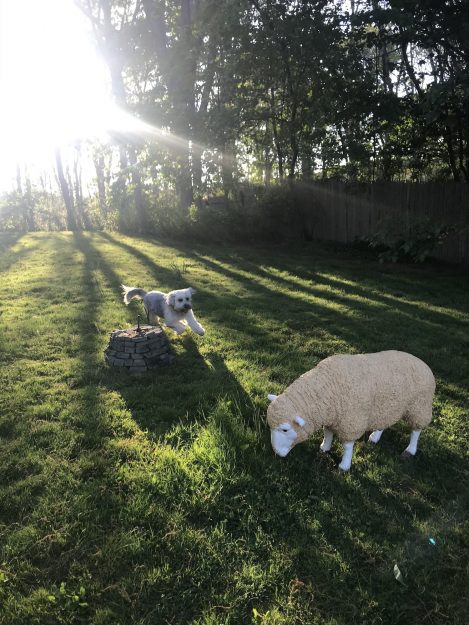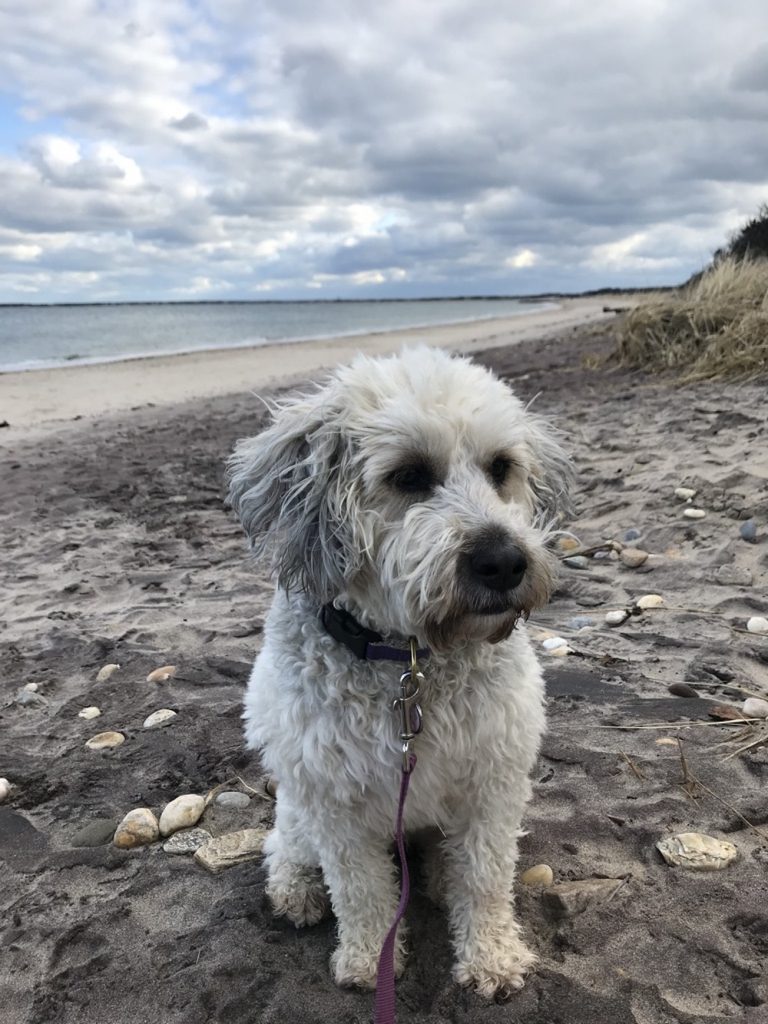“But very largely my current happiness is due to a diminishing preoccupation with myself.”
—Bertrand Russell
“Sentient beings are numberless; I vow to save them.”
—The first bodhisattva vow
As the holiday season is upon us, I’ve had shepherds on my mind. (I also have a shepherd in my life: my dog, Brooklyn, who not only looks like a sheepdog, all scruffy-mopped and wise-eyed, but acts like one too—guarding the fabric of our little family fiercely, and with great love and tenderness.)
This protective shepherd instinct is embedded deeply in my dog, and so it seems with most dogs. Take, for instance, the way Brooklyn behaves with our young son, Ollie—helping to put him to bed at night (no small feat), or calming his tantrums by letting him run his hands through her thick fur. Or consider the way she follows me around the house so closely and with keen watchfulness, almost as if herding me—or as if she’s a little concerned I might make a run for it. And then there’s the way she barks with such ferociousness at strangers when they approach our front door—mailmen, plumbers, flower delivery guys. (Never mind the fact that when someone unfamiliar actually enters our home, her vicious behavior quickly switches to joyous excitement, which makes me question my pup’s efficacy as a guard dog—after all, if it happened to be an actual intruder, Brooklyn would most likely welcome them eagerly, and with many wags and wiggles.)
Still, despite Brooklyn’s apparent failings, the shepherd intention—to guard her flock fiercely, and with endlessly attentive care—remains. It is indeed an admirable mode of existence, and one I’d ideally like to emulate in my own life. Is it really that strange to aspire to the life of a shepherd? After all, it’s one of humanity’s oldest professions, and, as both metaphor and vocation, shepherds hold a prominent place in almost every religion. Some of the great figures in the Bible were, of course, shepherds—Abraham, Moses, little David, who would one day become king. Muhammad, himself a shepherd in his youth, once declared, “… all of you are shepherds, and every one of you is responsible for his herd.” (Which is to say, we are all already shepherds, whether we’re aware of it or not.)

So it is in Zen, though of course, instead of shepherds, we use the term bodhisattva—but it’s sort of the same thing. To take the bodhisattva vow of saving all sentient beings, this is to be a shepherd to all of life—to your own life—to guard this precious universe and everything in it with all your heart and might.
This is no small task—which is one of the reasons the bodhisattva vows are sometimes called the “impossible vows.” (After all, if sentient beings are numberless, how could you possibly ever save them all?) And there are other issues with this line of thinking. Like, who the hell do you think you are that you’re the one to save everyone? (Or, to put it more intimately, who the hell do I think I am?) Yes, I can hardly take care of myself or my family (which apparently is why my dog feels she has to)—what makes me think I can tend to the whole universe?
And then there’s the fact that those sentient beings out there you vowed to save, well, an unfortunately significant number of them are apparently kind of assholes. But a true shepherd can’t pick and choose—they leave none of their flock behind.
Not that tending to those closest to you is any kind of cakewalk. After all, the ones you love the most are sometimes the most infuriating of all sentient beings—your spouse, your child—which I guess is why the homestead is such a place of constant and unavoidable practice.
And speaking of infuriating, there’s that most asinine of all sentient beings, the one who’s often the hardest to justify saving—yourself. I remember once, in an interview with one of my Zen teachers, talking about how difficult it was for me to take care of myself—or really, to have any self-compassion at all, like for some reason I didn’t deserve it. “Ah,” she said, knowingly—“saving all sentient beings but one.” I guess when it comes to the lofty, noble goal of saving all beings, it’s too easy to leave ourselves out of it. But, of course, you have to be a shepherd to yourself as well, sometimes first and foremost.
Brooklyn does this naturally, I think—almost like she instinctively knows that when you properly tend to yourself, you’re more capable of taking good care of everyone else. And so she takes her time cleaning herself—licking the backs of her paws calmly, deliberately, lovingly. She allows herself to drift off into long, much needed naps. She eats when she’s hungry, and laps up cool water when she’s thirsty.
This is our natural state, to be there for each other.
As with all giant endeavors, it’s wise to start small. Yourself, your family, your dog. Yes, I’ve been focused so far on how dogs are shepherds to us, but of course it goes the other way too—as much as our dogs guard us, we guard them. We feed them, walk them, pet them, love them. For many, a dog is the first real experience of having to truly care for another creature, and it can be a deeply awakening experience. This is one of the greatest gifts a dog can give its human—the chance for us to live for something other than ourselves. The chance to get out of our own heads, away from the self-obsessed drama, into the real world, where you have to get out of bed in the morning if only because there is this helpless, adoring creature that depends on you. Dogs have saved lives in this way, lifted people from deep depressions, changed the trajectory of their futures. Suddenly, you are living a bigger life, one dedicated to something beyond you and your tiny yet all-encompassing concerns. As Bertrand Russell’s quote suggests, this shift away from self is perhaps the only true path to happiness. It is also the path of the bodhisattva.
Strangely, I believe we are all already walking this path, whether we realize it or not. Naturally, we look after not just our dogs but each other too, an oft-forgotten fact. It is in our nature to care for the ones we love, to do what we can for them. We give each other gifts, warmth, companionship, presence. We give each other our hearts. And this shepherding instinct extends further and wider than just our own little flock. I always think of how, on the subway, when the train lurches and a fellow passenger stumbles, our hands shoot out so instinctively, so effortlessly, to steady them. This is our natural state, to be there for each other.
And it doesn’t need to be this big thing, either. When I say being there for each other, I don’t mean in any sort of annoying in your face kind of way—just there for each other. (Shepherds aren’t all up in their sheep’s business either—in fact, for the most part, they just let them be. Yes, when you think about it, shepherds don’t actually do very much. They wander with their flock, staff in hand; they find a smooth stone to sit on quietly and watch over things; they snooze lightly under the shade of a tree. More than anything, it seems it is their simple presence that keeps the flock safe, the wolves away.)
This is the way it is with Brooklyn too. She doesn’t really do all that much, and yet I can’t tell you how many times she has made me feel better. Sure, she has a knack for giving you kisses just when you need them most, or for wagging her tail at you in a way that softens your heart when a tough day has hardened it. But for the most part, it’s not anything she’s even doing, really—and it’s certainly nothing she’s saying—it’s just her presence, her warm, easy, loving presence. She can simply be lying there, snoozing, but that very fact makes my whole family feel safe, grounded, at ease. If Brooklyn is snoring, the home is at peace.
And so devoting yourself to being a shepherd and saving all sentient beings does not necessarily mean that you are constantly rushing around, doing, doing, doing—though there are certainly things to be done. It simply means that, as bodhisattvas, our first duty is to show up. After all, to be of comfort to others, your true, complete presence—alert, calm, grounded—is the biggest gift you can give. (Of course, being truly present is no easy task in and of itself, as anyone who’s ever meditated can attest to—but that’s fodder for another Brooklyn Chronicle.)
In the end, this bodhisattva way—to show up for each other—is not just limited to humans and dogs; rather, it seems the great way of all things. All sentient beings participate in it. (Interestingly, this implies that all sentient beings are themselves bodhisattvas—a wonderfully absurd vision, all these buddhas who decided to stay here to save a bunch of other buddhas who are already saved: yet another reason the vow is an impossible one, because in a certain sense, it’s already been accomplished.) This is perhaps most apparent here on earth, where the web of our ecosystem is an interdependent one. Life, in a crazy, chaotic, often violent manner, cares for itself. Naturally, everything is there for everything else, leaning on it, supporting it, shepherding it through existence. And the result is that every element is provided for—flowers are pollinated, fruit hangs from trees. Yes, consider this miraculous world we have been given, this blooming garden. The green fields, the sunshine, the sea. And, while it sometimes seems we humans have lost our way, we must not forget that we are an essential part of this system—in fact, as the apex predator, the head of the family, we’re meant to be its greatest stewards. It’s up to us to guard this life, this world, with such care.
There is great responsibility in being a shepherd. And sure, to take the weight of the world upon your shoulders may seem a burden, but perhaps to turn away from this duty is a motion that invites an even greater weight. Because this is what we were all put on this earth to do—to be here for each other—and so I imagine that dedicating ourselves to this would be such a sweet relief, that freeing feeling of finally doing what you’re meant to do. After all, to carry the world there must be a kind of lightness in your heart, which there is already—only now you are finally using it, now you are finally who you were always meant to be: a shepherd wandering the bodhisattva way, leading all sentient beings to the light. Yes, to take on the role of the shepherd is to finally find our rightful place in the world, our true calling, our long-lost vocation. It is, perhaps, to finally find happiness.
Of course, I spoke to Brooklyn about the whole thing just now, and she reminded me (without actually saying anything at all) that the point of being a shepherd isn’t to get anything out of it—it’s just to be loving and take care of your fellow creatures because that’s the Way. Taking care of you, taking care of others, taking care of life: taking care. This is what Brooklyn does so naturally, seemingly with hardly a thought. I guess that’s just who she is, a true doggysattva, saving all sentient beings except for chipmunks, squirrels, and that one beagle across the street who’s kind of a jerk.
Thank you for subscribing to Tricycle! As a nonprofit, we depend on readers like you to keep Buddhist teachings and practices widely available.
